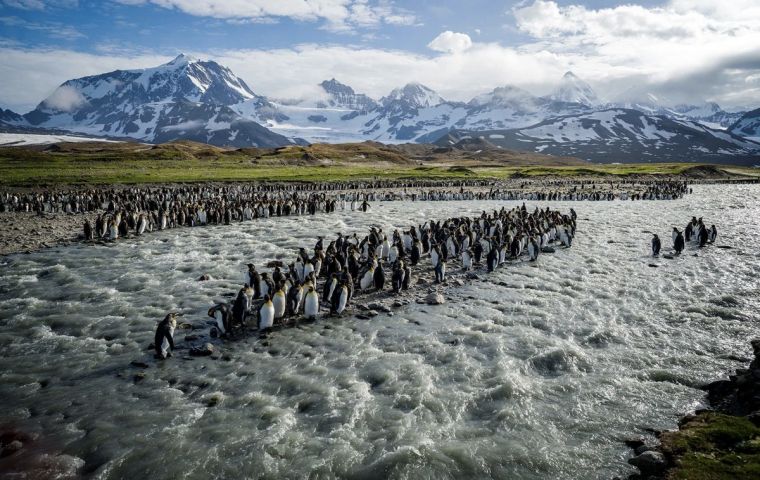MercoPress. South Atlantic News Agency
Drones survey wildlife populations in South Georgia
 King penguins among elephant seals at St Andrews Bay in South Georgia
King penguins among elephant seals at St Andrews Bay in South Georgia Next-generation fixed-wing drones, capable of operating autonomously beyond the standard visual line of sight, are creating datasets of major wildlife populations around South Georgia for long-term monitoring to aid conservation efforts.
The team from British Antarctic Survey travelled to South Georgia earlier this month to undertake aerial surveys of animal populations at risk from the effects of climate change. The island is an important haven for wildlife and is situated about 1,400km south-east of the Falkland Islands.
Working in collaboration with the Government of South Georgia and the South Sandwich Islands (GSGSSI), the team is using fixed-wing UAVs (Uncrewed Aerial Vehicles) to survey major elephant seal colonies, having previously surveyed gentoo penguins, king penguins, wandering albatross and fur seals.
South Georgia’s climate is changing and is particularly sensitive to the effects of global warming. Historically seal, whale and finfish were exploited on South Georgia with devastating long-term impacts. Through conservation efforts many species are recovering and the aerial surveys are urgently needed to provide accurate counts of animal populations as the planet warms.
Philip Hollyman, Ecologist at British Antarctic Survey said: “Many of these colonies have not been surveyed frequently due to cost and difficulty, this advance in technology vastly increases our capability to establish routine monitoring. We hope this project is the foundation for long-term monitoring of these sites in collaboration with GSGSSI, building up a picture of how these important species respond to changing environmental pressures.”
Nathan Fenney, Geomatics Specialist at British Antarctic Survey said: “This new technology with the ability to operate autonomously beyond the visual line of sight, enables us to survey multiple colonies from a single position, minimising our impact on South Georgia’s sensitive ecosystem.”
Mark Belchier, Director of Fisheries and Environment for the Government of South Georgia and the South Sandwich Islands said: “This exciting collaborative project opens-up the possibility of cost-effective monitoring for a range of iconic species that have breeding colonies at South Georgia. This information is key to establishing baseline data that will help us assess the effectiveness of our extensive marine and terrestrial protected areas over time.”
The next generation of UAVs can reach isolated areas and travel in the extreme weather conditions of the Southern Ocean, flying of speeds of up to 110kph and operating in winds of up 46kph. They are an efficient way to count and monitor wildlife populations and can make decisions on the best routes with minimal human input using pre-programmed flight plans.
The fixed-wing UAVs enable larger areas to be surveyed and it operates autonomously at a greater distance from the pilot than is usually possible through an advanced flight management system. This allows the team to survey areas otherwise difficult or impossible to access, while also minimising any impact on local wildlife.
Data from the fixed wing surveys will provide vital information on key higher predator species at South Georgia that will be used by the Government to ensure sustainable fisheries and minimal impact on the marine ecosystem.
The research is funded by Darwin Plus in collaboration with the Government of South Georgia and the South Sandwich Islands. The study will also feed into the UK Blue Belt Program – supporting UK Overseas Territories with the protection and sustainable management of their marine environments. (BAS)./




Top Comments
Disclaimer & comment rulesCommenting for this story is now closed.
If you have a Facebook account, become a fan and comment on our Facebook Page!